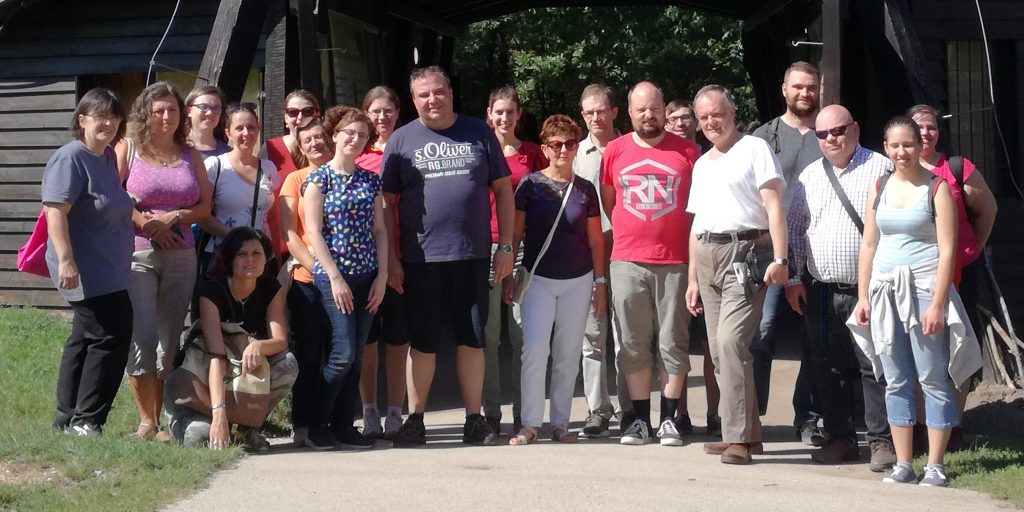Course principles: To satisfy the requirements of the Faculty of Pharmacy, the course in Organic Chemistry has two main purposes:
-
- The presentation of modern concepts and subject-matter concerning the structures, syntheses, physical and chemical properties, structure – property relationships, and practical applications of organic compounds, with special emphasis on bioactive molecules. The presentation and practical applications of the most important methods and tools of organic chemistry.
- To provide a solid molecular, organic chemical basis for subsequent subjects in the curriculum of students at the Faculty of Pharmacy.
The main research profiles in the Department of Organic Chemistry are involving primarily – preserving the departmental traditions at least partially – heterocyclic syntheses, preparation of compounds with chloride ion transporter effect, peptide chemistry, chemistry of bifunctional compounds, introduction of processes of „green chemistry” (such as use of solvents carbon dioxide neutral, elaboration of organic chemical reactions taking place in water, application of continuous-flow chemical technologies). The research work is facilitated by separation, spectroscopic and computational methods.

The aim of the education in organic chemistry is to create an organic chemical basis for subsequent subjects in the curriculum of students at the Faculty of Pharmacy. To attain this goal, besides the main lectures (112 hours in the 3rd and 4th semesters) and parallel laboratory practicals (110 hours) in organic chemistry, the Department offers a choice of a special course to its students (Drug Syntheses), and meanwhile, continuous enlargement of number of special courses is planned. The available methods based on Computational Chemistry and Molecular Modeling have been involved in the official education material since 1998. The teaching activities at the Department also include the introduction of selected students into research in organic and medicinal chemistry, the direction of diploma work and participation in the postgraduate (Ph.D.) education. The Department takes part in several international research and educational cooperation programmes (such as ERASMUS).
The Department additionally plays an important role in the postgraduate education of pharmacists, as organizer of the Medicinal Chemistry Programme, and offers a two-year postgraduate programme in Drug Research and Development.
The main research fields at the Department were the synthesis and chemical properties of heterocycles, including some natural products. In the last few years, important results have been achieved in the fields of synthesis strategies, including palladium-catalysed cross-coupling reactions of pyridazines and uracils, and mechanistic studies and the synthetic development of certain thermal rearrangement reactions. Another research field was at the Department involves medicinal chemistry with the design and synthesis of antiarrhythmic compounds, ligands of α-adrenoceptors and inhibitors of semicarbazide-sensitive amine-oxidase.
The Department cooperates in both research and education with several academic (e.g. the Semmelweis University Department of Pharmacodynamics, Department of Pharmacology and Pharmacotherapy, Department of Ophthalmology, and II. Department of Internal Medicine; Peter Pazmany Catholic University Faculty of Information Technology, the University of Debrecen, Pécs, and Szeged; the Hungarian Academy of Sciences Chemical Research Centre; the University of Vienna, Palermo, Cagliari, Universidad de CEU San Pablo (Madrid), National University Singapore); and industrial (Richter Gedeon, EGIS, Pannonpharma) organizations.
The main research profiles in the Department are involving primarily – preserving the departmental traditions at least partially – heterocyclic syntheses, preparation of compounds with chloride ion transporter effect, peptide chemistry, chemistry of bifunctional compounds, introduction of processes of „green chemistry” (such as use of solvents carbon dioxide neutral, elaboration of organic chemical reactions taking place in water, application of continuous-flow chemical technologies). The research work is facilitated by separation, spectroscopic and computational methods.